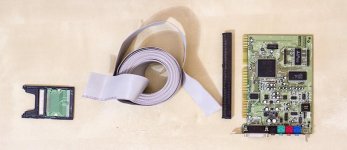Hello,
I would like to connect an ISA sound card to 486 laptop. I couldn't find any information about connecting ISA cards to laptops, so I thought I could construct an adapter by myself. I compared ISA nad PCMCIA pinouts and there a lot of similarities, but does anyone know, if simple 1:1 adapter (I would just make PCB with ISA slot and connect wires to PCMCIA pins) would work? Or would some special integrated circuits be needed in order to make it work?
If anyone has any information about this topic, it would be great (because making an adapter would take time and I wouldn't like to waste it, if it has no chances to work).
I would like to connect an ISA sound card to 486 laptop. I couldn't find any information about connecting ISA cards to laptops, so I thought I could construct an adapter by myself. I compared ISA nad PCMCIA pinouts and there a lot of similarities, but does anyone know, if simple 1:1 adapter (I would just make PCB with ISA slot and connect wires to PCMCIA pins) would work? Or would some special integrated circuits be needed in order to make it work?
If anyone has any information about this topic, it would be great (because making an adapter would take time and I wouldn't like to waste it, if it has no chances to work).

